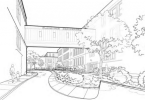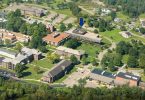Site Development Fund makes a key investment in infrastructure at Almono that positions the city’s last big brownfield to “turn the corner” toward vertical construction
The Power of 32 Site Development Fund LP has made a loan of $9.5 million to help fund critical site preparation – including construction of Pittsburgh’s first fully designed complete street – at Almono, the city’s last big brownfield. The nearly $49 million private, patient loan fund helps to close infrastructure financing gaps and increase the inventory of pad-ready sites in the 32-county greater Pittsburgh region. The Power of 32 Site Development Fund has 15 limited partners and concentrates its investments on eligible sites in 32 counties in western Pennsylvania and parts of Maryland, Ohio and West Virginia. Special consideration is given to brownfield sites that can be prepared for reinvestment.
A New Standard is Being Set at Almono
Almono is a 178-acre waterfront former brownfield located in the city’s Hazelwood neighborhood. Its name is aptly an amalgamation of the names of Pittsburgh’s three signature rivers: the Allegheny, Monongahela and Ohio. Formerly part of the J&L/LTV Steel Hazelwood Works, Almono is setting a new standard for public engagement, sustainability and brownfield redevelopment that markets will increasingly demand.
Beyond the commitment of Uber, Almono’s first official tenant, to utilize 42 acres on the site for a test track for its self-driving cars and to renovate the historic train roundhouse building for an Advanced Technologies Center; future investments in office, incubator and research facilities – plus housing and public open spaces – are expected to position the development as a greater regional hub.
A Signature Investment for the Power of 32 Site Investment Fund
“When we went through the Power of 32 regional visioning process – led by Pat Getty and the Benedum Foundation – there was consensus that more investment in infrastructure was critical and that we needed to get more brownfield sites ready for development – not just in Pittsburgh, but in the 32-county greater Pittsburgh footprint,” said Dennis Yablonsky, chairman of the Power of 32 Site Development Fund and CEO of the Allegheny Conference on Community Development, the organization which in partnership with the Benedum Foundation, spearheaded the creation of the Site Fund as a follow-up to the regional visioning process.
“This is a signature investment for the fund because of a new standard of sustainability, in the broadest sense, being integrated at Almono – Pittsburgh’s last big brownfield. The fund is excited to have invested in Pittsburgh’s first fully designed complete street, which is emblematic of the forward-thinking, world-class development taking place at Almono. This highly visible development can be a model for incorporating this standard at other sites and projects throughout the greater region,” remarked Yablonsky.
“What’s more, the direct and indirect benefits that are anticipated to ripple out from Almono – including jobs and access to centrally located innovation – have the potential to positively impact residents in Hazelwood, as well as other greater Pittsburgh region communities. With street construction – alongside other infrastructure work – nearly complete and street paving underway, Almono is positioned to turn the corner toward vertical construction and the possibilities that go along with that,” said Yablonsky.
Donald F. Smith, Jr., president of the Regional Industrial Development Corporation (RIDC) – the recipient of the Power of 32 Site Development Fund loan and the organization responsible for overseeing Almono’s site preparation – added, “Like so many brownfields in our region, Almono required massive infrastructure investment in order to create a pad-ready, infrastructure-rich environment that can capture much-needed growth opportunities generated by our world-class universities, medical research and healthcare. The fund’s loan filled a critical gap for financing site preparation and improvements which will be the foundation for new jobs, new taxes and new neighborhoods that will move our greater region forward.”
Connecting Hazelwood – and the Greater Region – to Opportunity
Literally opening up Almono from within and without to the greater region, the site’s fully designed complete street will also be a connector to Hazelwood, which saw its vitality decline when LTV Steel ceased operations in the late 1990s. “The closing of the mill led to a dramatic loss in the neighborhood’s population and years of disinvestment – not a new story for Pittsburgh,” said Hazelwood Initiative Executive Director Sonya Tilghman. “A lot of progress has been made to reverse that trend, and more progress definitely has to happen. But what’s planned for the Almono site – particularly the strong connections to the neighborhood, ample public space and workforce development opportunities – makes the site one of the anchors for the Hazelwood community’s redevelopment.”
Complete Streets: More Than Arteries to Move People and Goods
The complete street concept is critical to creating the developments of the future – places where community and mobility needs are in balance and where safety, independence, connectivity and healthy interaction are maximized. “A complete street allows pedestrians, bicyclists, motorists and transit riders to get from one place to another in convenient and efficient ways. It’s more than an artery for moving people and goods.
The complete street earns its name because of the vision and engineering that make it a focal point for intermodal and interpersonal activity and connections,” said City of Pittsburgh Mayor William Peduto, who has been a champion for a complete streets policy that will impact the design, construction and maintenance of city streets, sidewalks and other public infrastructure.
“Investing in smart, multimodal transportation infrastructure is among the greatest needs facing Pittsburgh. It will support economic growth, as well the health and safety of everyone in the city, said Peduto. “Through complete streets policies and programs we will commit to the quality design and maintenance of rights of way and further mark Pittsburgh as a leader in 21st-century planning.”
Almono’s new main transportation artery has the distinction of being the first fully designed complete street in the city of Pittsburgh.
Amenities and improvements that make complete streets more accommodating to all users, as well as the ecology, may include – but are not limited to – adding bike lanes, bump outs, planters, curb ramps, street furniture, transit amenities, shorter crossing distances, audible signals and green infrastructure.
Planners and developers are embracing approaches that are suited to the site’s ecology, in particular its prime waterfront location, which will make Almono a model development on the environmental front. Complete street construction includes engineering and infrastructure to lessen environmental impact, including mitigation of storm water runoff through features such as porous pavement, which will help improve water quality in Pittsburgh’s three rivers.
Other Strategic Power of 32 Site Development Fund Investments
In addition to the loan to Almono, the Power of 32 Site Development Fund has made, to date, two other loans totaling $8.3 million: $2.6 million to Trimodal Terminal, LP in Follansbee, W. Va. – an 80-acre brownfield site along the Ohio River and $5.7 million to Phase II of Clinton Commerce Park in Findlay Township in the strategically important Pittsburgh International Airport Corridor – a gateway in and out of the greater region – by air and by interstate – which is attractive to businesses looking to invest near major transportation assets and infrastructure.
“Metropolitan regions are critical competitive units in the modern economy. The people engaged in the Power of 32 visioning process recognized the increasing demand in the greater region for larger development sites for businesses that will have regional economic and employment impact. It made sense to create a fund which could invest in increasing pad-ready sites across the region,” said Pat Getty, president of the Claude Worthington Benedum Foundation – an investor in the Power of 32 Site Development Fund and, along with the Richard King Mellon Foundation and Heinz Endowments, an owner of Almono. “Many of the most promising sites are brownfields, like Almono, that lost their original purpose when the steel industry declined. Redeveloping these sites means that places such as Hazelwood, Follansbee, W. Va., and other similar communities in the greater region, can have a significant opportunity to benefit in the future economy.”
Allegheny County Chief Executive Rich Fitzgerald concurs, “This region has a reputation of being a national leader in brownfield redevelopment. Working together – government alongside the business and foundation communities – we’re transforming old industrial sites into economic assets. Our investment in these sites positions them for success with private sector investment following because the market is there.”
The Fund is continuing to take applications for investment. Visit P32SiteFund.com to learn more, including a list of the 32 counties in which projects must be located.
The Power of 32 Site Development Fund LP is overseen by a Board of Managers. Callay Capital LLC serves as the Fund Manager and is the point of contact for projects seeking investment from the Fund. The Fund is built on the belief that successful business investment depends on all the strengths of the 32-county region regardless of geographic boundaries, and that an investment in real estate at any one location benefits the region as a whole.
About Almono:
A partnership of the Benedum Foundation, Heinz Endowments, RK Mellon Foundation and RIDC to develop a sustainable riverfront community with significant economic impact.
Media Contact:
Phil Cynar
Allegheny Conference
pcynar@alleghenyconference.org
412-281-4783, ext. 4573







